Abstract
Cancer is one of the top 10 deadliest diseases in the world. Initial shock from being diagnosed with cancer gives way to a realization of the tremendous physical, emotional, and spiritual challenges that lie ahead. Beyond the emotional turmoil that accompanies a cancer diagnosis, patients face a practical necessity to develop a plan to live with and fight cancer. According to Health Minister Datuk Seri Dr. Dzulkefly Ahmad, cancer has emerged as the second highest cause of death among Malaysians in 2018. This study is scrutinizing level of awareness and readiness among the Malaysia Citizens in Kuala Terengganu in dealing with cancer. Education, access to healthcare facilities and socio-cultural factors still influenced the likelihood of the people to go for cancer screening and get cancer treatment. Consequently, health information, communication, and cancer screening awareness campaign should be intensified to reach the public especially to the rural population. These efforts and initiatives can increase public access to information about cancer, and cancer screening and treatment facilities among the rural population, and especially those belonging to high-risk groups. Fear of the increasing number of cancer patients, this study perhaps will help the government and policymakers to look at the factors and reasons in order to educate people about cancer and increase their level of awareness. Finally, this study will help to improve the wellbeing of the people and align to the social re-engineering dimension was highlighted in the 12th Malaysia’s Plan.
Keywords: CancerknowledgeawarenessKuala Terengganu
Introduction
In Malaysia, the number of individual that has been diagnosed by cancer is increasing every year. Cancer has huge impact on individual, family, and society in Malaysia and all over the world. About 60 percent of the cancer prognosis among the people in Malaysia is only detected in the last stage which is in the third and fourth stages. More worryingly, World Health Organization (WHO) statistics show that about 70 percent of the population of low- and middle-income countries are at risk of cancer with a 60 percent increase over a 20-year period. Statistics from the Ministry of Health Malaysia found that one in four Malaysia is at risk of cancer at the age of 75, thus making cancer the second highest cause of death in the country. It is very important that all individuals should be sensitive to any changes or symptoms in their body, as the current scientific evidence show that every individual have a risk to diagnose with cancer. Even an early screening or screening test is important because it can detect cancer at an early stage and this will increase the chances of combating the disease and healing.
In Malaysia, printed educational materials are widely used in cancer education and knowledge related to cancer (Chung, 2020). However, information in printed educational materials available in Malaysia is less successfully distributed to the people in the suburban and rural area and people with low educational background because most books had been written in English and only cater to certain level of society. Although the government have proactively to open more cancer facility in Malaysia, nevertheless it will be not be sufficient without the knowledge and awareness of society.
Problem Statement
Cancer is a disease that is greatly feared by humans. Cancer occurs as a result of uncontrolled cell growth. Cancer becomes a danger of appearing often normal function in the body and use through special-symptoms. Usually, these symptoms are just looking at the cancer has been in the chronic stage. The Malaysian National Cancer Registry Report 2012 to 2016 (MNCRR), showed an increase in cancer rates in stage three and four, thus showing a reduction in cancer cases in the stages one and two. Breast, colorectal, lung, lymphoma, nasopharyngeal, leukaemia, prostate, liver, cervical (cervical) and ovarian cancers are among the 10 types of cancer detected by Malaysians for 2012 to 2016 (Azizah et al., 2019). Cancer usually will lead to death if it has been detected in the later stage. The reason that lead to a last minute diagnosed and treatment are lack of knowledge and awareness about cancers. Previous studies have reported that cancer prevention knowledge is very important and it should be learned since individual in younger ages (Linsell et al., 2010; Robb et al., 2009). Beside cancer education and awareness program only focusing to certain group of society such as people stay in the capital, this study scrutinized level of awareness and readiness among Malaysian society located far away from the capital in dealing with cancer.
It is thus imperative to design training programs for students in universities that increase the level of awareness on the risk factors of cancer and the importance of early diagnosis and intervention (Mafuvadze et al., 2013; Shin et al., 201). This study was performed with the goal of determine the levels of awareness towards early cancer detection program in Kuala Terengganu, Malaysia.
Research Questions
The research questions for this study are as follows:
This study aims to evaluate whether the respondents aware about early detection cancer program, about the self-examination (SE), aware about the knowledge related to early detection cancer program and awareness related to the screening related to types of cancer. This study also aims to evaluate about.
How much percentage of the level awareness among the public towards early detection cancer program?
What is the current level of knowledge and consciousness among the public towards early detection cancer program?
Purpose of the Study
The purpose of this study can be outlined as follows:
To measure the level awareness among the public towards early detection cancer program
To measure the level knowledge and consciousness among the public towards early detection cancer program.
Research Methods
This study utilizes quantitative methods based on surveys, expert opinion, and literature and existing knowledge in this area. A total of 119 respondents involved in this study were access through online and physical questionnaire distributed to people of Kuala Terengganu, Terengganu Malaysia. The study accompanied various level of sample with any cancer experience and those who did not experience any cancer cases.
The data were collected using structured questionnaire developed been adopted from the questionnaire used by Madubogwu, et al. (2017). The questions have been divided into a few sections namely sociodemographic, knowledge related to Early Cancer Dectection, the practice, and knowledge related to clinical test for Early Cancer Detection. Sociodemographic sections cover questions related to marital status, job, education level, and age. The survey aims to analyse whether respondents aware about Early Cancer Detection and to analyze their basic knowledge related to Early Cancer Detection and clinical test of Early Cancer Detection.
Findings
This questionnaire been answered by the respondents in Kuala Terengganu, Malaysia. A total of 119 respondents involved in this study were access through online and physical questionnaire distributed to people of Kuala Terengganu, Terengganu Malaysia. The study accompanied various level of sample with any cancer experience and those who did not experience any cancer cases.
Discussion on Early Cancer Detection Program
Based on the Figure
The location of Kuala Terengganu, Malaysia could be one of major reason why almost 50% still not aware with early cancer detection program which heavily promoted by Ministry of Health, Malaysia.
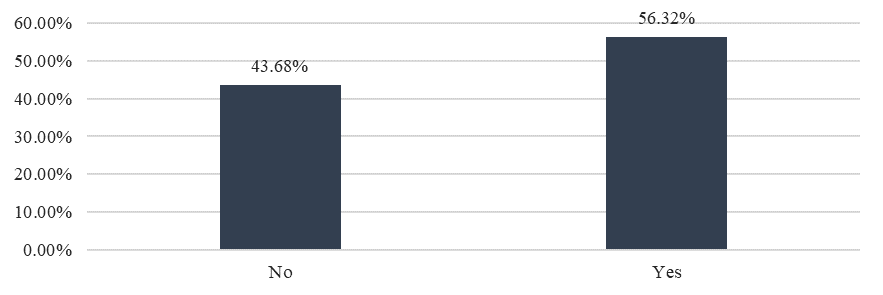
Discussion on Education Level
Education level plays important roles towards the awareness of any detection program, the argument is based on the level of literacy and capability in dealing and react with new changes or programme which organized by the government. Based on Figure
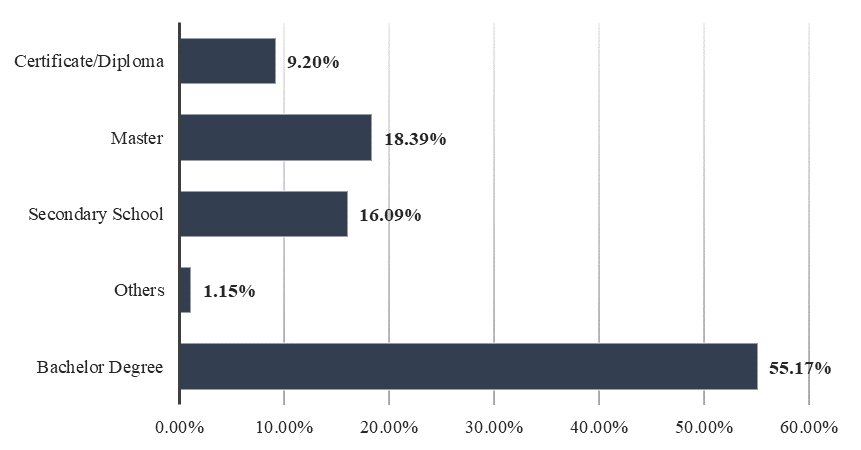
Discussion on to detect cancer at early stage
Previous discussion was highlighting on the awareness of early cancer detection, but by having that level of consciousness it may lead to another question, How early could the cancer be detected? Based on Figure
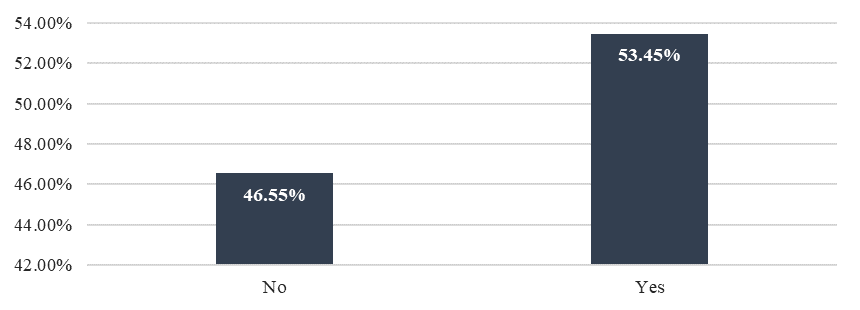
Discussion on Analysis of Family/Relative members suffering of cancer
As shown in Figure
The early detection has to be done frequently for those who has family history compare to those who haven’t has any relative member suffering from cancer. It could be also a good reminder to start the healthy life style by consuming healthy foods and avoiding those foods which could be cancer contributor.
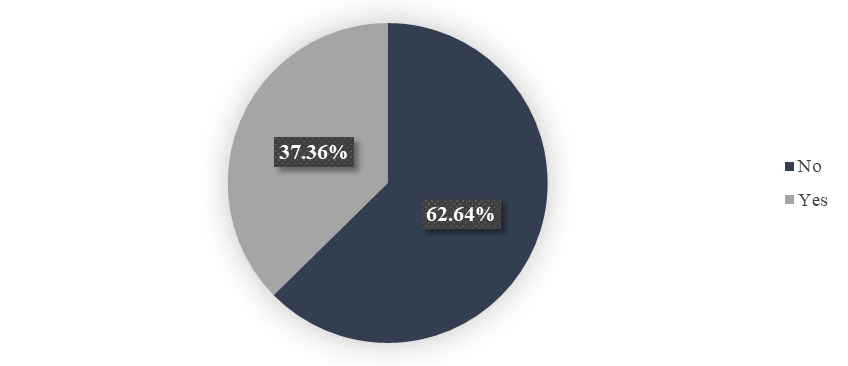
Discussion on Analysis of Types of cancer suffered by respondent’s family members.
Based on the Figure
Thus, it is highly recommended to the respondents who have any family members suffering with cancer need to get consultation from doctors on the cancer symptoms based on types of cancer and get a right medication from the registered medical officers.
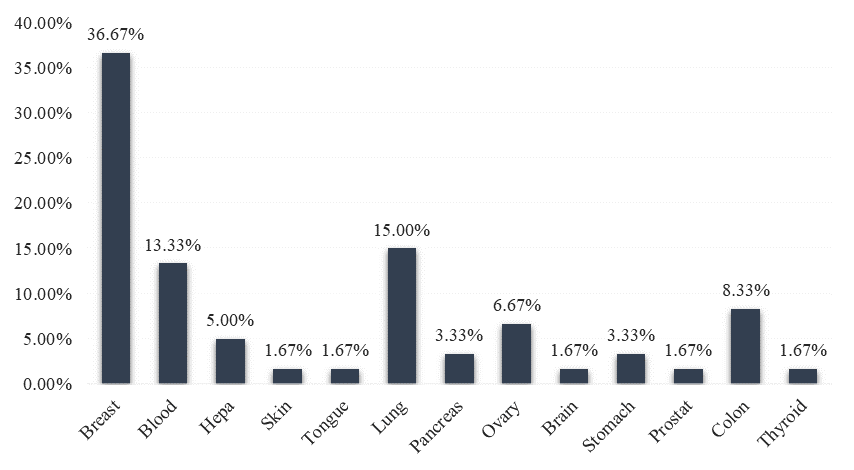
Limitation
Among the limitation of the study including the participants hesitant to reveal the historical background of their health condition, the respondent did not want to discuss about the cancer disease in serious ways, and some respondents were shy to participate in this survey.
Recommendation
Future study can focus on the others behavioural factors such as individual’s attitude, subjective norm, and perceived behavioural control which can influence the individual attention to get early diagnosis in the cancer treatment.
Conclusion
As a conclusion, responsible bodies such as local health office and government related bodies need to be proactive in reducing the rate of cancer in local community by increasing the awareness of the local community regarding cancer and how the test can be conducted, always take care and give support to individual diagnosed with cancer, and provide ongoing training regarding the importance to get early detection of cancer.
References
- Azizah, A. M., Hashimah, B., Nirmal, K., Siti Zubaidah, A. R., Puteri, N. A., & Nabihah, A. (2019). Malaysian National Cancer Registry Report 2012-2016. Malaysia Cancer Statistics, Data and Figure. Ministry of Health, Putrajaya.
- Chung, J. (2020). Keberkesanan Bahan Pendidikan Bercetak Untuk Penjagaan Pemakanan Dalam Kalangan Penjaga Pesakit Kanser Kanak-kanak di Institut Pediatrik Hospital Kuala Lumpur. Jurnal Sains Kesihatan Malaysia (Malaysian Journal of Health Sciences), 18(1).
- Linsell, L., Forbes, L. J., Burgess, C., Kapari, M., Thurnham, A., & Ramirez, A. J. (2010). Validation of a measurement tool to assess awareness of breast cancer. European Journal of Cancer, 46(8), 1374-1381.
- Madubogwu, C. I., Egwuonwu, A. O., Madubogwu, N. U., & Njelita, I. A. (2017). Breast cancer screening practices amongst female tertiary health worker in Nnewi. Journal of Cancer Research and Therapeutics, 13(2), 268.
- Mafuvadze, B., Manguvo, A., He, J., Whitney, S. D., & Hyder, S. M. (2013). Breast cancer knowledge and awareness among high school and college students in mid-Western USA. International Journal of Science Education, Part B, 3(2), 144-158.
- Robb, K., Stubbings, S., Ramirez, A., Macleod, U., Austoker, J., Waller, J., & Wardle, J. (2009). Public awareness of cancer in Britain: a population-based survey of adults. Nature Precedings, 101, 18-23. https://doi.org/10.1038/npre.2009.3817.1
Copyright information

This work is licensed under a Creative Commons Attribution-NonCommercial-NoDerivatives 4.0 International License.
About this article
Publication Date
30 December 2020
Article Doi
eBook ISBN
978-1-80296-099-0
Publisher
European Publisher
Volume
100
Print ISBN (optional)
-
Edition Number
1st Edition
Pages
1-905
Subjects
Multi-disciplinary, accounting, finance, economics, business, management, marketing, entrepreneurship, social studies
Cite this article as:
Abd Razak, S. F. F. B., Abdul Manaf, N. B., Abd Razak, M. Z. B., Rasli, M. A. B., & Baidi, N. B. (2020). Knowledge And Awareness Of Malaysia Citizens Towards Facing And Coping With Cancer. In N. S. Othman, A. H. B. Jaaffar, N. H. B. Harun, S. B. Buniamin, N. E. A. B. Mohamad, I. B. M. Ali, N. H. B. A. Razali, & S. L. B. M. Hashim (Eds.), Driving Sustainability through Business-Technology Synergy, vol 100. European Proceedings of Social and Behavioural Sciences (pp. 406-412). European Publisher. https://doi.org/10.15405/epsbs.2020.12.05.43

